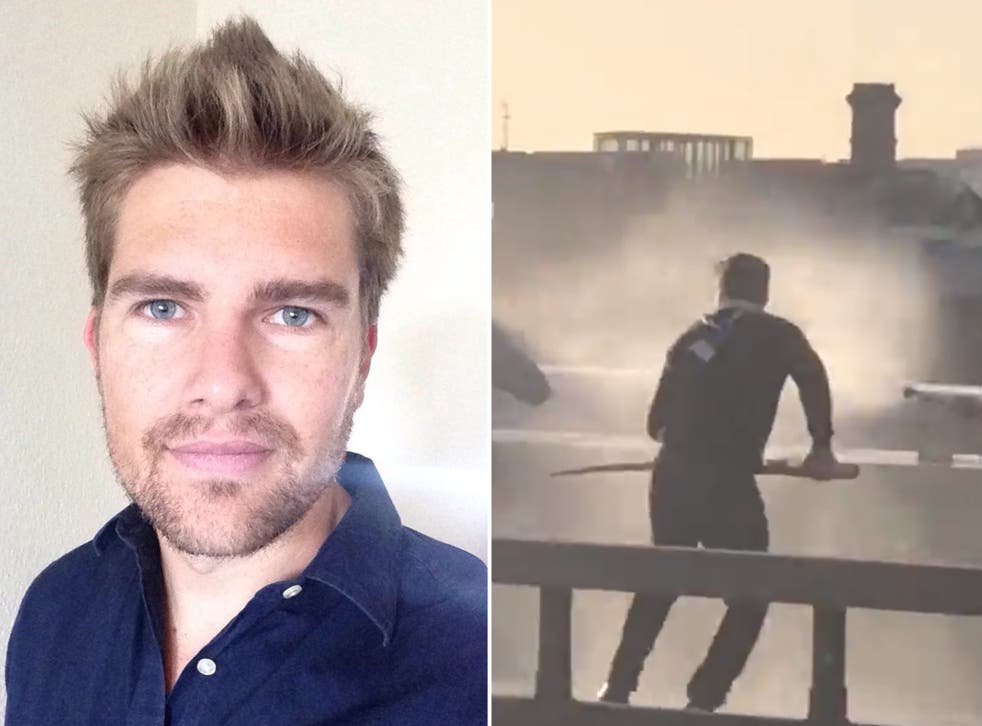Footage of bystanders fighting a terrorist using makeshift weapons including a narwhal tusk and fire extinguisher have been played at an inquest.
Usman Khan was armed with two knives and an “authentic-looking” suicide vest when he was set upon by men including two convicted murderers and a civil servant.
The 28-year-old terrorist launched his attack at a prisoner rehabilitation event in Fishmongers’ Hall, London, on 29 November 2019.
He started the rampage after his first victim, 25-year-old Jack Merritt, chanced upon him making preparations in the men’s toilets, then fatally stabbed 23-year-old Saskia Jones in an adjoining cloakroom.
Giving evidence at the opening of the inquests into the two victims’ deaths, a counter-terror police officer said Khan was then “confronted by attendees” of the Learning Together event in a reception area.
Read more:
“A number of individuals managed to take various items from the walls and use them as weapons to defend themselves and others,” DCI Dan Brown said.
“Among the items used to hold him back was an ornamental pike from wall next to a statue, and a narwhal tusk someone had got from upstairs.”
The hearing, being held a short distance from the scene of the attack at London’s Guildhall, heard that after Khan was set upon he forced a member of staff to let him out of the locked front door.
CCTV footage played to the inquest showed Khan being pursued by Steven Gallant, a convicted murderer who was on day release at the time.
Khan, who had taped two large kitchen knives to his hands, turned to attack Gallant and forced him to retreat.
The video showed Gallant re-emerging with a large narwhal tusk and fighting the terrorist. The tusk was broken in the struggle, but footage then showed another man joining the fray.

Civil servant Darryn Frost helped to pin down Usman Khan on London Bridge before the terrorist was shot by police
(PA/KNS)
John Crilly, who also has a murder conviction, armed himself with a fire extinguisher from Fishmongers’ Hall and started to blast Khan with the contents, forcing him backwards on London Bridge.
Footage showed members of the public starting to run from the scene as a kitchen porter who was stabbed while fighting Khan, Lukasz Koczocik, could be seen bleeding heavily on the steps.
Gallant and Crilly started to chase Khan over London Bridge, followed by civil servant Darryn Frost, who had armed himself with a second narwhal tusk.
Footage shown to the hearing from CCTV and dash cams showed another official, Steven Machin, running in to help subdue Khan as the men managed to force him to the ground.
Crilly could be seen trying to bash the knives out of Khan’s hands with the fire extinguisher as the struggle continued and members of the public joined the effort.
Four passers-by, Jeremy Meek, Charles Morgan, Ahmed Mumuni and Marc Conway, threw themselves into the fight shortly before the first armed police officers arrived on the scene.
The inquest heard that the three City of London Police officers told the men to move back, with Mr Frost left as the last person pinning Khan down.
Ex-offender who took on London Bridge attacker says he was prepared to lose his life
In body-worn footage taken by one of the police officers, one of the men could be heard shouting that Khan had murdered two people and calling him a “f***ing scumbag”.
DCI Brown said that as officers got closer, they saw Khan was wearing what they believed to be a real suicide vest and ordered people to move away.
After Mr Frost was pulled to one side, one of the officers shot Khan and another fired his Taser.
But Khan was “still very much alive” and footage showed him continuing to move, rolling around on the ground and moving his jacket so his fake suicide belt could be clearly seen.
Footage taken from a helicopter showed Khan manage to sit up at 2.10pm, around eight minutes after he was shot.
On police radio communications, someone could be heard saying “I can see a viable IED on him” before a voice said: “He is trying to get up.”
The inquest heard that by that point, more armed police officers had gathered at the scene and had their weapons trained on Khan.
Several opened fire after seeing him sit up, and more shots were fired shortly afterwards, when a “critical shot authorisation” had been given.
Khan was not seen moving after 2.12pm but was not formally declared dead until 3.07pm, the hearing was told.
The fake suicide vest Fishmongers’ Hall terrorist Usman Khan was wearing
(Met Police)
Inspection of Khan’s suicide vest later found it was “authentic-looking” but fake. It had been created using a slimming belt, battery charges, Xbox components, bandages, cling film and tape.
DCI Brown said Khan was believed to have constructed it at his home in Stafford, and then strapped it to himself during a seven-minute toilet break on the train to London.
He concealed the bulk of the belt under clothing and a puffer jacket, which he refused to fully remove during the Learning Together event, despite other attendees reporting that the venue was warm and taking off their coats.
The inquest heard that Khan had also armed himself with two kitchen knives, which he taped to his hands, and had inscribed the Arabic word for God in the metal.
DCI Brown said investigators were “satisfied that he acted completely alone” in the attack and that there was no evidence anyone else was aware of his plans.
The inquest is expected to last for several weeks, and will be followed by a separate jury inquest into the death of Khan.
The terrorist had been jailed in 2012 as part of a jihadist cell that plotted to bomb the London Stock Exchange.
The inquests will examine the monitoring of Khan after he was released from prison in December 2018, and his participation in rehabilitation and deradicalisation programmes.









